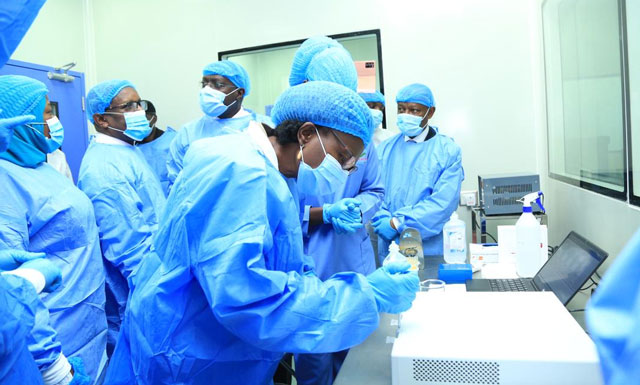
Kampala, Uganda | THE INDEPENDENT | Results of a study conducted in laboratories run in public and private not-for-profit health facilities in Central Uganda show that the labs do not have the required facilities to handle emergencies, with some lacking basic must-haves such as spill kits and first aid boxes.
This study was conducted by researchers at Makerere University Walter Reed Project (MUWRP) in the districts of Mukono, Buikwe, Buvuma and Kayung, where they surveyed Health Centre IIIs, Health Centre IVs and general hospitals. The researchers were assessing the compliance and effectiveness of the Ministry of Health’s recommended biosafety practices and guidelines at public health laboratories.
Maurice Ndawula, the study coordinator, says researchers found that higher-level facilities were more compliant with standard guidelines than lower-level facilities.
He said only eight of the thirty-five Health Center IIIs had first aid kits, but added that even high-level facilities still need help in managing some critical pathogens.
Apart from their ability to respond to emergencies where they found only thirty- one per cent of all the facilities surveyed to be complying with guidelines, the study team also checked the level of lab staff training, disinfecting or cleaning of lab equipment and bio security which involved assessing how secure the facilities were in terms of authorized access and data security among others.
According to Prossy Naluyima, the Laboratory Director at MUWRP, facilities scored highest when it came to training.
Reacting to findings of the study, Joseph Nkodyo, the National Coordinator Biosafety and Biosecurity at the Ministry of Health, said the ministry is going to use these results to step up emergency preparedness, noting that as the ministry, they also periodically to such audits to establish how safe public health labs are.
Meanwhile, experts attending the meeting raised an alarm that laboratories are facing a bigger challenge of how to dispose of medical waste, with some citing that some facilities have no clue on how to handle this waste, something that’s not just dangerous to them but also surrounding communities.
Nkodyo acknowledged the challenge and said that the ministry faced a hiccup when one of the partners who were financing the disposal of medical waste pulled out, but has now developed new means to ensure that the waste is picked up.
*****
URN
 The Independent Uganda: You get the Truth we Pay the Price
The Independent Uganda: You get the Truth we Pay the Price




These laboratories
Who do they recruit?
Who trained who ever they recruit?
It is very sad that one has a work force with varied knowledge
We need financial assistance to collect waste from sites
But the facility should have a safety plan
The staff should be conversant with what to do
Such knowledge should be imparted from the training
Then the individual gets oriented in the application if that knowledge at the work place
This should be routine practice
Training division, there is a gap
Please attend to it
Do these districts
Have District Laboratory Focal Persons?
How do other countries sustain practice without shifting goal posts
Visiting sn established institution in zSouthern Africa, everything flows smoothly without hearing of project
There is no pomp
But works gets done, while paying attention to the standard
There is Science guiding laboratory practice,
It is not debatable
You either do it or keep off
What happened to safety manuals, training, support supervision
Wajama?!